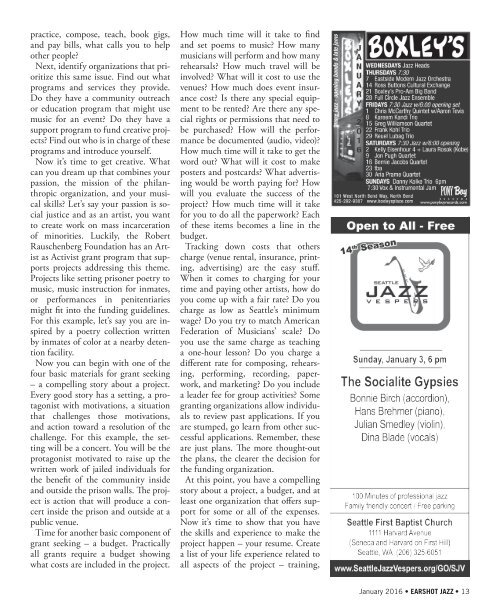Create successful ePaper yourself
Turn your PDF publications into a flip-book with our unique Google optimized e-Paper software.
practice, compose, teach, book gigs,<br />
and pay bills, what calls you to help<br />
other people?<br />
Next, identify organizations that prioritize<br />
this same issue. Find out what<br />
programs and services they provide.<br />
Do they have a community outreach<br />
or education program that might use<br />
music for an event? Do they have a<br />
support program to fund creative projects?<br />
Find out who is in charge of these<br />
programs and introduce yourself.<br />
Now it’s time to get creative. What<br />
can you dream up that combines your<br />
passion, the mission of the philanthropic<br />
organization, and your musical<br />
skills? Let’s say your passion is social<br />
justice and as an artist, you want<br />
to create work on mass incarceration<br />
of minorities. Luckily, the Robert<br />
Rauschenberg Foundation has an Artist<br />
as Activist grant program that supports<br />
projects addressing this theme.<br />
Projects like setting prisoner poetry to<br />
music, music instruction for inmates,<br />
or performances in penitentiaries<br />
might fit into the funding guidelines.<br />
For this example, let’s say you are inspired<br />
by a poetry collection written<br />
by inmates of color at a nearby detention<br />
facility.<br />
Now you can begin with one of the<br />
four basic materials for grant seeking<br />
– a compelling story about a project.<br />
Every good story has a setting, a protagonist<br />
with motivations, a situation<br />
that challenges those motivations,<br />
and action toward a resolution of the<br />
challenge. For this example, the setting<br />
will be a concert. You will be the<br />
protagonist motivated to raise up the<br />
written work of jailed individuals for<br />
the benefit of the community inside<br />
and outside the prison walls. The project<br />
is action that will produce a concert<br />
inside the prison and outside at a<br />
public venue.<br />
Time for another basic component of<br />
grant seeking – a budget. Practically<br />
all grants require a budget showing<br />
what costs are included in the project.<br />
How much time will it take to find<br />
and set poems to music? How many<br />
musicians will perform and how many<br />
rehearsals? How much travel will be<br />
involved? What will it cost to use the<br />
venues? How much does event insurance<br />
cost? Is there any special equipment<br />
to be rented? Are there any special<br />
rights or permissions that need to<br />
be purchased? How will the performance<br />
be documented (audio, video)?<br />
How much time will it take to get the<br />
word out? What will it cost to make<br />
posters and postcards? What advertising<br />
would be worth paying for? How<br />
will you evaluate the success of the<br />
project? How much time will it take<br />
for you to do all the paperwork? Each<br />
of these items becomes a line in the<br />
budget.<br />
Tracking down costs that others<br />
charge (venue rental, insurance, printing,<br />
advertising) are the easy stuff.<br />
When it comes to charging for your<br />
time and paying other artists, how do<br />
you come up with a fair rate? Do you<br />
charge as low as Seattle’s minimum<br />
wage? Do you try to match American<br />
Federation of Musicians’ scale? Do<br />
you use the same charge as teaching<br />
a one-hour lesson? Do you charge a<br />
different rate for composing, rehearsing,<br />
performing, recording, paperwork,<br />
and marketing? Do you include<br />
a leader fee for group activities? Some<br />
granting organizations allow individuals<br />
to review past applications. If you<br />
are stumped, go learn from other successful<br />
applications. Remember, these<br />
are just plans. The more thought-out<br />
the plans, the clearer the decision for<br />
the funding organization.<br />
At this point, you have a compelling<br />
story about a project, a budget, and at<br />
least one organization that offers support<br />
for some or all of the expenses.<br />
Now it’s time to show that you have<br />
the skills and experience to make the<br />
project happen – your resume. Create<br />
a list of your life experience related to<br />
all aspects of the project – training,<br />
January 2016 • Earshot Jazz • 13


